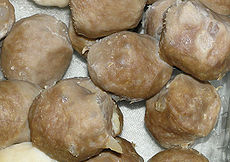Beef ball (Chinese:
| Beef ball | |||||||||||||||||||||||||
|---|---|---|---|---|---|---|---|---|---|---|---|---|---|---|---|---|---|---|---|---|---|---|---|---|---|
 Pre-cooked beef balls | |||||||||||||||||||||||||
| Chinese | |||||||||||||||||||||||||
| Hanyu Pinyin | niúwán | ||||||||||||||||||||||||
| Cantonese Yale | ngàuyún | ||||||||||||||||||||||||
| Literal meaning | beef ball | ||||||||||||||||||||||||
| |||||||||||||||||||||||||
Production
editNearly all meatballs (made from pork, beef, fish, or other animal flesh) made in Asia differ significantly in texture to their European counterparts. Instead of mincing the meat, which is done for meatballs of European origin, cooks pound the meat until it is pulverized. This process lends itself to the meatballs' smooth texture. Pounding, unlike mincing, uncoils and stretches previously wound protein strands in meat and allows them to cure to a gel with heat in a similar manner as surimi. This technique is also often used for meat fillings in steamed dishes.
After the meat is prepared, it is divided into balls, seasoned, and boiled in water. With prolonged cooking, the tiny pieces of tendon from the meat in the balls will dissolve. The result is meatballs with a tender, bouncy texture.
Hong Kong
editBeef balls are commonly mixed in with wonton noodles and other fish ball noodles. It is available in traditional markets and supermarkets. Beef balls are also a popular ingredient for hot pot dishes. It has a variety of uses within Chinese cuisine.
Some Hong Kong grocery stores and markets have controversially been found to sell beef balls that contain other kinds of ground meat, such as pork and chicken.[2] This discovery raised concerns for religious customers who cannot eat pork.
See also
editReferences
edit- ^ Elaine (October 13, 2022). "Beef Balls". China Sichuan Food. ChinaSichuanFood.com. Retrieved May 28, 2023.
- ^ "Muslim workers in Hong Kong angry over 'tainted' meat". www.ucanews.com. Retrieved 13 May 2013.